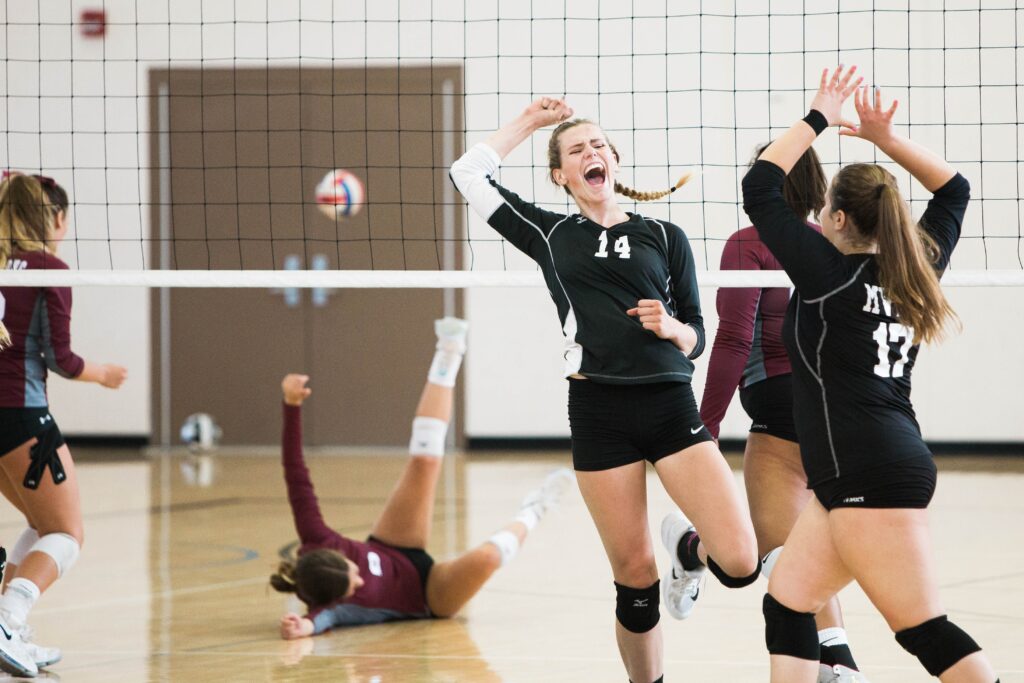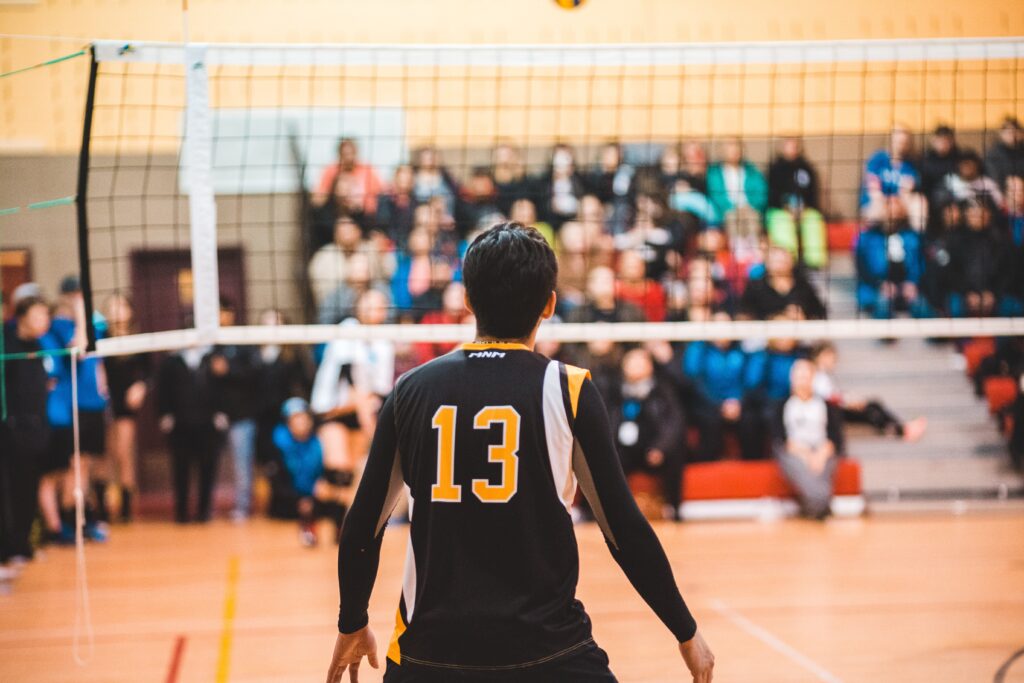It might seem excessive to celebrate every single point but this is part of the team spirit that is so important in volleyball. So why do a lot of volleyball teams cheer after every point? Let’s discuss what I have learned from 10 years of playing volleyball and several years of coaching volleyball teams.
Reasons to cheer after every point:

You have to work together as a team to score a point and if you celebrate afterward, everyone feels involved, not just the person that scored the point. Everyone feels appreciated this way. It also creates positive energy and motivates people to play harder. It can be challenging to play volleyball as there is a lot of back-and-forths and you can be tired after a while. If you celebrate a point together, you will feel good. It also helps you to remain concentrated on the game.
The celebrations are not that wild, you just cheer for a second or give each other a high five. In some sports, they dance or take quite a lot of time to celebrate a point. In volleyball, this is not the case. It is just a short recognition that you made a point and that everyone did a good job. You move forward soon after this. Therefore I would say that it is appropriate to celebrate each point as it improves the confidence of the players and makes them feel good. If you don’t celebrate your small wins, you will feel less positive about them and it might feel not that special.
For me, it is a lot of fun to cheer as you can make funny noises or faces. It is a great moment to joke around and have fun. This creates a bond between the players as well.
Another reason to cheer when you score a point is to intimidate the other team. They will notice that you are having a lot of positive energy and that might take them off their game. They might feel that you have a good connection and that it is difficult to break your defense. There are a lot of mental games in volleyball and if you can discourage your opponent, it will be easier to score points and win the game. You don’t have to be mean and taunt the other team too much as this can motivate them. Just keep the celebration normal with a high five or a short cheer and keep it moving from there. You also don’t have time to do more as the game needs to keep going and you need your momentum.

Smashing a ball can release a lot of adrenaline. This can give you a pump in energy. This wants to make you cheer and celebrate. So there is a biological component to celebrating as well as a lot of emotions are released after you have scored a point. It can be better to release these so that you are not too hyped up when you have to play another ball. You have to find a balance between a lot of energy but you also shouldn’t be too energetic while playing volleyball as ball handling is important as well. Therefore releasing the spike in energy with a short cheer can help you to keep the right amount of energy during a game.
Why some teams don’t cheer after every point
Some teams don’t cheer for every point and that is ok as well it depends on the team culture. Sometimes people think that it is silly but as discussed before, cheering for every point that you score can have a positive impact on the team and how you play. It should not distract you from the game. Some players have a hard time refocusing on the game after cheering. Therefore they prefer to keep this to a minimum and this is fine as well. You have to see what works for you or your team.
If you are losing a game really badly, people might cheer less after scoring a point as they feel that they have a long way to go. At this point, the team might be demoralized and there might be some tension between the players. Therefore some players might be angry and they might not celebrate a point.
On the other hand, if you are winning by a big margin, you might not want to cheer as the other team is feeling bad already. Some people think that it is bad taste to celebrate at this point as you are already winning and you shouldn’t be too arrogant. At this point, it is possible to tone down the celebrations and just give a quick high five instead of a loud chant.
If you are really exhausted and need all your energy to focus on the game, you can skip the celebration as well. Often this does not take that much energy but sometimes you have played for a long time and just need a minute to get a breath in. Therefore you sometimes see that there is less cheering at the end of the game as players prefer to rest for a short period of time instead of setting additional steps to huddle.

Older players might be less excited about cheering as they want to keep the game moving forward. After several years it can get silly to cheer for every point and they only celebrate difficult points. Even professional players tend to celebrate points that were difficult to score. The ball can go back and forth for several minutes during a professional game and it can be a big relief if you finally score a point. The excitement and suspense can make it natural to release the tension with a short cheer or thumbs up. Typically every team will celebrate a point that was difficult to score.
In some countries in cities, they tend to cheer more than in others. This depends on the personalities and local culture. Some people are more introverted and they might want to think about how they scored whereas other people tend to be extroverts that want to celebrate everything. You don’t have to take it personally if one of your team members is less excited about a point, maybe were disappointed by their own actions or they might be tired.
How people cheer after scoring a point
There are several ways to cheer a point that was scored. You can use a simple thumbs-up, a group hug, a shout, or singing a song. Some teams do this in the direction of their supporters, other teams try to taunt the other team and do it in their direction. It is also possible to involve the players on the bench to make sure that the whole team is feeling positive about how the match is evolving. Players on the bench sometimes lose their rhythm, if they get involved in the cheers, they can feel that they are still part of the game and this can motivate them when they get back on the field.
Some teams also sing or shout something. It has to be noted that players that are sitting on the bench can’t join as this is not allowed. They will get penalized if they come on the court to cheer.
Let’s take a look at an example below:
You have to be careful that you don’t cheer too much or you can get a penalty. Removing your shirt, running too far off the field, making certain movements, or teasing your opponent too much can get you in trouble. Therefore you have to keep the celebrations civil and not too crazy. There is also not much time to cheer as the referee gives the signal to serve and the players have to do this within a very short timeframe. Therefore most teams just high-five each other after scoring a point and move from there. If they have won a set, there is more time to celebrate and some teams give a group hug or perform a short dance.
Are cheers planned in advance?
Some teams discuss in advance how they will cheer. This can be related to the birthday of one of the players or someone that they want to thank. For example, you can thank your coach or someone that performed an errand for the team. Most often, however, things go organically and you just see in the moment itself how you want to celebrate the point. There is not always a lot of time to celebrate the point so you sometimes have to make do with a short high five and move from there. You don’t want to cheer for too long as you can lose your concentration.
Teams sometimes also cheer when they enter the court while they are playing some music that pumps them up for the game.
You can look up online how other teams cheer and copy them. Often it is simple movements or a short chant. Your supporters can chime in and you can have a short back-and-forth with them to make it a fun moment. Let’s take a look at some fun cheers below:
To conclude, we can say that there are a lot of reasons why volleyball players cheer after every point. This ranges from bonding with other players, to feeling better and releasing a spike in energy. There are also moments where you want to cheer less and focus more on the game. Overall, cheering can give a good feeling and a lot of players enjoy doing it. It is also allowed to do so if you don’t take too much time or don’t make it too crazy.